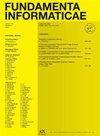部分词自动机问题的计算复杂度
IF 0.4
4区 计算机科学
Q4 COMPUTER SCIENCE, SOFTWARE ENGINEERING
引用次数: 5
摘要
我们考虑了部分词自动机相关问题的计算复杂性。粗略地说,部分词是其中某些位置未指定的词,而部分词自动机是接受部分词语言的有限自动机——在这里,单词中未指定的位置由一个“孔”符号本文章由计算机程序翻译,如有差异,请以英文原文为准。
On the Computational Complexity of Partial Word Automata Problems
We consider computational complexity of problems related to partial word au- tomata. Roughly speaking, a partial word is a word in which some positions are unspecified, and a partial word automaton is a finite automaton that accepts a partial word language— here the unspecified positions in the word are represented by a "hole" symbol ⋄. A partial word language Lcan be transformed into an ordinary language L by using a ⋄-substitution. In particular, we investigate the complexity of the compression or minimization problem for partial word automata, which is known to be NP-hard. We improve on the previously known complexity on this problem, by showing PSPACE-completeness. In fact, it turns out that almost all problems related to partial word automata, such as, e.g., equivalence and universality, are already PSPACE-complete. Moreover, we also study these problems under the further restriction that the involved automata accept only finite languages. In this case, the complexity of the studied problems drop from PSPACE-completeness down to coNP-hardness and containment in § P depending on the problem investigated.
求助全文
通过发布文献求助,成功后即可免费获取论文全文。
去求助
来源期刊

Fundamenta Informaticae
工程技术-计算机:软件工程
CiteScore
2.00
自引率
0.00%
发文量
61
审稿时长
9.8 months
期刊介绍:
Fundamenta Informaticae is an international journal publishing original research results in all areas of theoretical computer science. Papers are encouraged contributing:
solutions by mathematical methods of problems emerging in computer science
solutions of mathematical problems inspired by computer science.
Topics of interest include (but are not restricted to):
theory of computing,
complexity theory,
algorithms and data structures,
computational aspects of combinatorics and graph theory,
programming language theory,
theoretical aspects of programming languages,
computer-aided verification,
computer science logic,
database theory,
logic programming,
automated deduction,
formal languages and automata theory,
concurrency and distributed computing,
cryptography and security,
theoretical issues in artificial intelligence,
machine learning,
pattern recognition,
algorithmic game theory,
bioinformatics and computational biology,
quantum computing,
probabilistic methods,
algebraic and categorical methods.
 求助内容:
求助内容: 应助结果提醒方式:
应助结果提醒方式:


